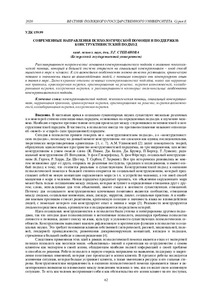Please use this identifier to cite or link to this item:
https://elib.psu.by/handle/123456789/25258Full metadata record
| DC Field | Value | Language |
|---|---|---|
| dc.contributor.author | Степанова, Л. Г. | - |
| dc.contributor.author | Stepanova, L. | - |
| dc.date.accessioned | 2020-07-02T06:06:54Z | - |
| dc.date.available | 2020-07-02T06:06:54Z | - |
| dc.date.issued | 2020 | - |
| dc.identifier.citation | Степанова, Л. Г. Современные направления психологической помощи и поддержки: конструктивистский подход / Л. Г. Степанова // Вестник Полоцкого государственного университета. Серия E, Педагогические науки. - 2020. - № 7. - С. 62-67. | ru_RU |
| dc.identifier.uri | https://elib.psu.by/handle/123456789/25258 | - |
| dc.description.abstract | Рассматриваются теоретические основания конструктивистского подхода к оказанию психологической помощи, который в большей степени опирается на социальный конструктивизм – иной способ мышления о мире и человеке. К его важнейшим особенностям можно отнести релятивизм, критическую позицию и значимость языка во взаимодействии людей, с помощью которого они конструируют опыт и знания о мире. Дается краткое описание основных конструктивистских подходов, таких как нарративная практика, краткосрочная терапия, ориентированная на решение, терапия возможностей, коллаборативная терапия, когерентная терапия, и рассматриваются некоторые отличительные особенности конструктивистского подхода.= The article discusses the theoretical foundations of the constructivist approach to the provision of psychological assistance, which relies more on social constructivism, which is another way of thinking about the world and man. The most important features of social constructionism include relativism, the critical position and importance of language in the interaction of people, with the help of which they construct experience and knowledge about the world. The article also provides a brief description of the main constructivist approaches, such as narrative practice, solution-focused brief therapy; possibility therapy, collaborative therapy and coherent therapy, and discusses some of the distinctive features of the constructivist approach. | ru_RU |
| dc.language.iso | ru | ru_RU |
| dc.publisher | Полоцкий государственный университет | ru_RU |
| dc.relation.ispartof | Веснік Полацкага дзяржаўнага ўніверсітэта. Серыя E, Педагагічныя навукі | be_BE |
| dc.relation.ispartof | Herald of Polotsk State University. Series E, Pedagogical Sciences | en_EN |
| dc.relation.ispartof | Вестник Полоцкого государственного университета. Серия E, Педагогические науки | ru_RU |
| dc.relation.ispartofseries | Серия E, Педагогические науки;2020. - № 7 | - |
| dc.rights | open access | ru_RU |
| dc.subject | Государственный рубрикатор НТИ - ВИНИТИ::ОБЩЕСТВЕННЫЕ НАУКИ::Психология | ru_RU |
| dc.subject | Конструктивистский подход | ru_RU |
| dc.subject | Психологическая помощь | ru_RU |
| dc.subject | Социальный конструкционизм | ru_RU |
| dc.subject | Нарративная практика | ru_RU |
| dc.subject | Краткосрочная терапия | ru_RU |
| dc.subject | Ориентированная на решение | ru_RU |
| dc.subject | Терапия возможностей | ru_RU |
| dc.subject | Коллаборативная терапия | ru_RU |
| dc.subject | Когерентная терапия | ru_RU |
| dc.subject | Constructivist approach | ru_RU |
| dc.subject | Psychological help | ru_RU |
| dc.subject | Social constructionism, narrative practice | ru_RU |
| dc.subject | Solution-Focused Brief Therapy | ru_RU |
| dc.subject | Possibility Therapy | ru_RU |
| dc.subject | Collaborative Therapy | ru_RU |
| dc.subject | Coherence Therapy | ru_RU |
| dc.title | Современные направления психологической помощи и поддержки: конструктивистский подход | ru_RU |
| dc.title.alternative | Modern Directions of Psychological Help and Support: Constructivist Approach | ru_RU |
| dc.type | Article | ru_RU |
| dc.identifier.udc | 159.99 | - |
| Appears in Collections: | 2020, № 7 | |
Items in DSpace are protected by copyright, with all rights reserved, unless otherwise indicated.
